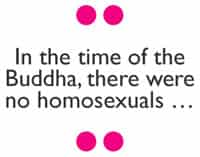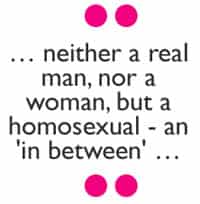
I am quite new to Thailand _ only 30 days have gone by since I put my feet on Thai soil and everything is still mystifying, bewildering, and puzzling to me. The small smoke-filled spirit houses containing tiny shots of Sang Som; the pretty ladies who
aren’t really ladies; the fried creepy crawlies people wolf down with gusto and the ubiquitous temples, sparkling and spellbinding. But most of all, I am intrigued by the hordes of tonsured, saffron clad males of all ages and sizes who wander the city carrying their batras (charity bowls). This month, Citylife is featuring a Pink Issue, and as an intern I had to come up with a relevant feature. So the other day, while getting lost in small alleys, I came across a monk and immediately wondered what he thought of the whole Pink Issue? Indeed, how does Buddhism view homosexuality?

I grew up in Europe and since I am part Danish/part Turkish, I was raised with the Abrahamitic monotheistic faiths and their views on homosexuality. Mom was semi-Christian; dad, a very moderate Muslim. Both faiths pretty much express that falling for a person, who has the same ‘equipment’ as yourself is a BIG no-no! But what did The Awakened One say about the matter? Being an aspiring investigative journalist, I decided to probe the waters and seek the Buddhists view on homosexuality.
I did some studying on my own but I could not unearth any Buddhist scriptures on the subject. And since the primary source is out of my reach, I went to ‘Monk Chat’, an event held at Wat Suan Dok three times a week. Here you _ indeed anyone _ can ask a follower of the faith questions about their religious convictions. I took a seat in front of Thuriya, a 26 year old Burmese monk who has worn the cloak for 13 years. Thuriya is a Theravada Buddhist. This is the oldest branch of the faith and perhaps the closest you can get to the original foundation _ at least according to some scholars. The robust fellow held my eyes with an intense, almost scrutinising gaze, when I asked him if Siddhartha ever talked about homosexuality.
”In the time of the Buddha, there were no homosexuals, so our great teacher did not mention anything about this; hence it is difficult to discuss the subject from a Buddhist point of view. But I must say that the contemporary Buddhist stance is that it is not acceptable, since it is sexual misconduct,” Thuriya explained _ after a long silence.
I could sense that he was somewhat uncomfortable discussing the matter even though he reassured me that this was an open conversation. I decided to dig a little deeper and asked him how he would explain why some people feel attracted to a person of the same gender.
”Well, if you, in one of your existences, do not succeed in refraining from sexual misconduct, this can lead to bad karma regarding your sexual condition. Because of this, in a subsequent life, you might be reincarnated as neither a real man, nor a woman, but a homosexual _ an ‘in between’,” he continued.
I have read that Buddhists do not believe in sin, but cause and effect. And I know that Buddha was mostly concerned with suffering, and the means by which you can end suffering and reach enlightenment. A part of the solution is to keep from breaking the five (or sometimes eight) precepts. You should not kill, steal, be promiscuous, lie or intoxicate your mind. Thuriya had mentioned that homosexuality, in his faith, was perceived as sexual misconduct or promiscuity. So I wondered if all homosexual relationships were perceived this way…even the monogamous ones.
”Well, that is a difficult question. As I see it, if for instance, two men are in a monogamous relationship, it might not be bad karma or a break of the precept regarding sexual misconduct. But I am not sure,” the monk told me.
Being a total novice regarding this belief system, I accepted the explanation from the sincere monk. But still I wondered; was this a pure account or was it somewhat biased due to Thai culture. I therefore ventured to Chiang Mai University to get the academic interpretation. I was greeted by a lecturer in philosophy and religion, Somwang Kaewsufong, a neat looking man, who radiated intellectualism. He confirmed that Buddha never really touched upon the matter according neither to tradition nor to scriptures. The lecturer then went on to elaborate on Thuriya’s exposition regarding why homosexuality could be caused by bad karma:
”This might sound sexist to you, but in Buddhism the highest physical state one can be reborn into is that of a man. This is because only a ‘natural’ man can reach enlightenment and become a Buddha. So when you are born as an ‘in between’ it must be because of bad karma, since it increases your suffering.”
I still wondered why homosexuality would increase your suffering in this day and age. Surely there are lots of gay people who live enjoyable lives with plenty of material possessions, a partner they love, children they care for and the freedom to be who they really are.
”In Buddhism material wealth, physical pleasure and social status do not equal inner bliss. If gay people often are faced with intolerance, if they are kept from achieving certain liberties in life and if they struggle within themselves because of their preference, it could be considered they are not at ease and unable to find peace,” he explained.

”No, not at all. In Buddhism everyone is equal and has the same right to pursue the main goal; to purify your mind from greed, hate and delusion,” the lecturer told me.
I left Somwang’s office with a sense of confusion. It appears that there are no clear guidelines within the Buddhist faith concerning homosexuality. Maybe there are those who think they’ve discovered a lost precept, the proud owners of the Buddhist apocrypha. Or maybe the faith is open to interpretation.
At the end of the day, we might never know how Siddhartha Gautama actually thought about the matter. The scriptures were all written hundreds of years after his physical demise, but it is pretty much accepted that he was one of the greatest humanitarians that ever lived.
